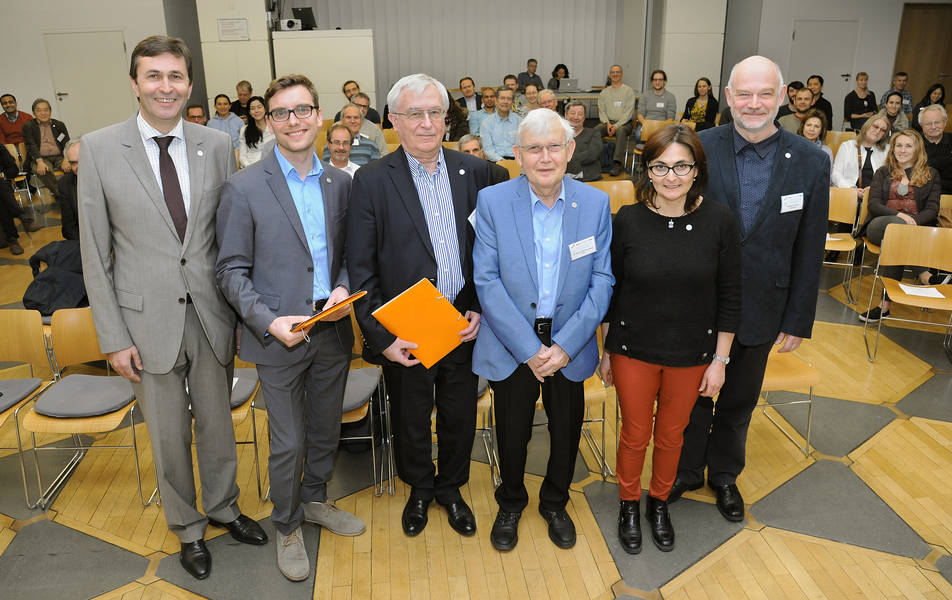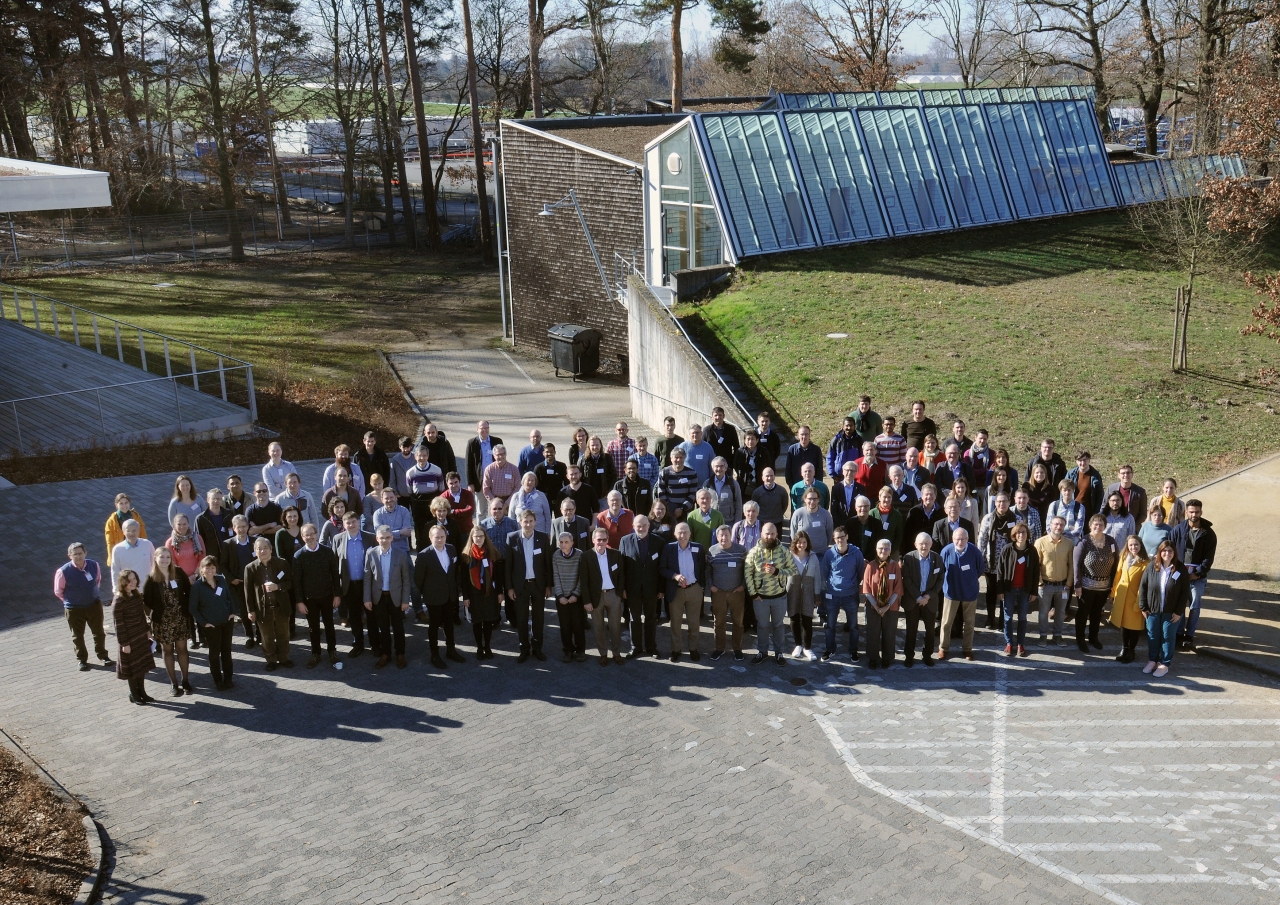Sie sehen momentan nur den öffentlichen Teil des GSI-Kuriers.
Um auch die GSI-internen Artikel angezeigt zu bekommen,
melden sie sich bitte an

Kurier - Messages from and for employees
Ausgabe: 11-2019 | 11.03. - 17.03.
News
News
FAIR GENCO Award for Dr. Moritz Pascal Reiter
This year, Dr. Moritz Pascal Reiter from the II. Physikalisches Institut of the Justus Liebig University in Gießen received the FAIR GENCO Award for young scientists. The award is sponsored by the FAIR-GSI Exotic Nuclei Community (GENCO) and endowed with 1,000 Euro. The bestowal by GENCO president Professor Christoph Scheidenberger and vice-president Professor Wolfram Korten took place in February in a special colloquium in the framework of the yearly GENCO meeting at FAIR and GSI. Every year, the FAIR-GSI Exotic Nuclei Community (GENCO) presents its Young Scientist Award to a young researcher at the beginning of their scientific career. The international GENCO jury, composed of seven renowned nuclear scientists, elects the winner in a competitive procedure, where several candidates, working in theory or experiment, are evaluated. Furthermore two scientists were honored with a GENCO Membership Award.
Dr. Moritz Pascal Reiter received the FAIR GENCO Award for his impressive research achievements in the areas of nuclear astrophysics and nuclear structure physics. He used a multiple-reflection time-of-flight mass spectrometer, which he implemented at the TITAN experiment at the Canadian research facility TRIUMF in Vancouver. It is a game-changer, opening-up multiple new venues for exciting mass measurements, especially on very short-lived nuclei. Already in the first two years of operation, about 200 isotopes could be studied.
The two scientists assigned with the GENCO Membership Award are:
- Professor Dolores Cortina-Gil for her significant involvement in pioneering reaction experiments with relativistic radioactive beams to pin down single particle structure information of exotic nuclei from the study of weakly and deeply bound nucleons and for her exceptional contributions to the realization of the CALIFA detector.
- Professor Andrey Popeko for his essential contributions to the discovery of the elements darmstadtium, roentgenium, and copernicium at the SHIP detector of GSI/FAIR, the development of a long-term strategy for superheavy element research, for the design of a second-generation in-flight separators for the superheavy element factory in Dubna, and many important findings on nuclear structure and chemical properties of superheavy elements.
FAIR-GENCO-Nachwuchspreis für Dr. Moritz Pascal Reiter

v.l.: Professor Christoph Scheidenberger (GENCO-Präsident), Dr. Moritz Pascal Reiter (Preisträger FAIR-GENCO-Nachwuchspreis), Professor Andrej Popeko (neues GENCO-Mitglied), Professor Gottfried Münzenberg, Professorin Dolores Cortina-Gil (neues GENCO-Mitglied), Professor Wolfram Korten (GENCO-Vizepräsident) Foto: G. Otto, GSI
Der FAIR-GENCO-Preis für Nachwuchswissenschaftler erhielt dieses Jahr Dr. Moritz Pascal Reiter vom II. Physikalischen Institut der Justus-Liebig-Universität in Gießen. Der sogenannte „Young Scientist Award“ wird von der GSI Exotic Nuclei Community (GENCO) vergeben und ist mit 1.000 Euro dotiert. Die Verleihung durch den GENCO-Präsidenten Professor Christoph Scheidenberger und Vizepräsident Professor Wolfram Korten fand im Februar auf dem GENCO-Jahrestreffen im Rahmen eines Festkolloquiums bei FAIR und GSI statt. Der FAIR-GENCO-Preis wird jedes Jahr an junge Forscherinnen und Forscher verliehen, die am Beginn ihrer wissenschaftlichen Karriere stehen. Die internationale GENCO-Jury besteht aus sieben renommierten Kernphysikern und wählt den Preisträger in einem Auswahlverfahren aus, in dem mehrere Vorschläge aus Theorie und Experimentalphysik evaluiert werden. Ferner wurden zwei Wissenschaftlerinnen und Wissenschaftler mit dem GENCO Membership Award, einer Mitgliedschaft bei GENCO, ausgezeichnet.
Dr. Moritz Pascal Reiter wurde für seine beeindruckenden Forschungsergebnisse in den Bereichen der nuklearen Astrophysik und Kernstrukturphysik mit dem FAIR-GENCO-Nachwuchspreis ausgezeichnet. Er verwendete dazu ein Multireflektions-Flugzeit-Massenspektrometer, welches er am TITAN-Experiment an der kanadischen Forschungsanlage TRIUMF in Vancouver implementierte. Dadurch ermöglichte er eine Vielzahl an neuen Massenmessungen, vor allem an sehr kurzlebigen Kernen. In den ersten zwei Betriebsjahren konnten bereits ca. 200 verschiedene Isotope untersucht werden.
Die zwei Wissenschaftlerinnen und Wissenschaftler, die den GENCO Membership Award erhielten, sind:
- Professorin Dolores Cortina-Gil für ihre bedeutende Beteiligung an bahnbrechenden Reaktionensexperimenten mit relativistischen radioaktiven Strahlen zur Beschreibung der Strukturinformation einzelner Teilchen exotischer Kerne durch die Untersuchung schwach und tief gebundener Kerne, sowie für ihre außergewöhnlichen Beiträge zur Realisierung des CALIFA-Detektors.
- Professor Andrey Popeko für seine Beiträge zur Entdeckung der Elemente Darmstadtium, Roentgenium und Copernicium am SHIP-Detektor bei GSI/FAIR, die Entwicklung einer langfristigen Strategie für Forschung mit superschweren Elementen, das Design einer zweiten Generation von Separatoren für die Superschwere-Elemente-Fabrik in Dubna und viele wichtige Erkenntnisse zur Kernstruktur und -chemie von superschweren Elementen.
Öffentlichkeitsarbeit
NUSTAR Annual Meeting 2019
The NUSTAR Annual Meeting was held at GSI in the week February 25 to March 1. With well over 200 international participants the attendance was again very high this year. It was very positive to see many young scientists who recently joined the collaboration. The attendees were impressed by the substantial progress in the realization of FAIR, in particular concerning the building construction. Considerable progress is also apparent in the development and realization of NUSTAR detector set-ups and their associated infrastructure, both for phase-0 and phase-1. The phase-0 experiments at GSI this year and next year were discussed comprehensively and constructively. The need of continuous beam time opportunities in the following years until the FAIR facility becomes operational was emphasized strongly. Latest research highlights from successful experiments at GSI and other laboratories were broadly discussed.
During the full week, many working groups used the opportunity to discuss their developments, to report on latest results and to plan the next steps of their work.
NUSTAR Annual Meeting 2019

Participants of the NUSTAR Annual Meeting 2019 Quelle: G. Otto
Vom 25. Februar bis 1. März fand bei GSI das jährliche NUSTAR Arbeitstreffen der Kernphysiker statt. In diesem Jahr war die Beteiligung mit deutlich über 200 internationalen Teilnehmern wieder groß. Besonders erfreulich war, dass viele junge Wissenschaftler neu hinzugekommen sind. Beeindruckt waren die Teilnehmer von den bedeutenden Fortschritten bei der Realisierung der FAIR Anlage, insbesondere beim Bau. Wesentliche Fortschritte wurden auch bei Entwicklung und Realisierung von NUSTAR Detektorgruppen und deren Infrastruktur berichtet. Damit liegt die Instrumentierung weiterhin voll im Plan für Phase-0 und Phase-1. Ausführlich und konstruktiv wurden die anstehenden Experimente der Phase-0 in diesem und im nächsten Jahr diskutiert. Dabei wurde immer wieder die Notwendigkeit betont, auch in den Folgejahren bis zur Inbetriebnahme der FAIR Anlage Experiment Strahlzeiten durchzuführen. Breiten Raum fanden die Diskussionen zu den jüngsten Forschungs-Highlights der erfolgreichen Experimente bei der GSI sowie an vielen auswärtigen Forschungseinrichtungen.
Während der gesamten Woche nutzten Sub-Kollaborationen wieder die Gelegenheit in vielfältigen Arbeitsgruppen ihre Entwicklungen zu erörtern, erzielte Ergebnisse vorzustellen und die weitere gemeinsame Arbeit zu planen.
J. Gerl, FAIR/GSI, Tel. 2643
CS Workshop
The 14th annual CS-Workshop is meant to bring the users and developers of the LabVIEW based CS and CS++ framework together to discuss about the present status and future developments. It will take place at
GSI in KBW 2.28, from March 19, 2019, Tuesday, 09:00 to March 22, 2019, Friday, 12:00.
The first part of the workshop will consist of several talks. The larger part will be a hands-on training course in which we want to show you how to program with CS++. We want to create small standalone CS++ application for your experiments.
Refer to https://wiki.gsi.de/foswiki/bin/view/CSframework/CsWorkshopMarch2019 for details.
Everybody is welcome to join. Please forward this information to whom it may concerns.
H. Brand, EEL Electronics
Die aktuellen internen Stellenausschreibungen finden Sie auch unter www.gsi.de/jobsintern
Gruppe PER-PAD












